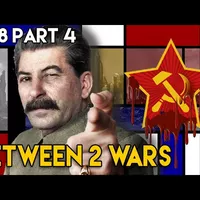Stalin's Paranoid Military Purges - The Great Terror | BETWEEN 2 WARS I 1938 Part 4 of 4 - YouTube (2)
it seems that it didn't serve a clear purpose at all.
Some theories seem plausible until you take a closer look. The most common one is that
Stalin simply pursued total power and that he wanted to get rid of anyone who was, is
or might become his opponent. But that doesn't explain the grand scale of the purges - ranging
from high ranking officers to ordinary workers and soldiers. Another common explanation is
Stalin's paranoia. He saw civil disobedience and internal conspiracy everywhere and was
afraid of a foreign invasion of the Soviet Union. But we don't know if he was actually
paranoid - historians aren't trained to diagnose anyone with anything. And as Stalin
is dead now, neither can psychiatrists.
But even IF he was paranoid, why did he decide to purge his military NOW, with the growing
prospect of war?
For war is looming in 1937 and 38, that's for sure. The Soviet Military budget skyrockets
in the late 1930s, Stalin definitely knows that 'something is up'. The Second Sino-Japanese
War breaks out in 1937 - and keep in mind that Manchuria borders the USSR. At the same
time, Hitler is re-arming the Rhineland, re-arming his army, and aiming his arrows to the east.
But still, Stalin disables his Red Army by removing a ton of experience and vision - not
a smart move if you're about to enter a war, you might think.
But think of this: ever since the Revolution, twenty long years before the start of the
Great Terror, many groups, movements, individuals, and states have tried to influence Soviet
politics. Political feuds left losers bitter in dead-end positions, and so, loads of enemies
have been made along the way, many of whom are still somehow operating in the Soviet
Union. And though the many smaller or larger uprisings and attempts to overthrow the Soviet
Government were manageable in the 1920s and early 1930s, would they still be manageable
during a war with Germany or Japan? Or both?
So in the event of war, those internal enemies, old and new, might become a big problem. Cynically
speaking, Stalin and his government had made an enormous mess to get where they are in
1937, and they want to clean house before inviting new guests. Stalin deals with all
his old enemies or with friends he things might challenge his position in case of a
war. The 'whites' from the Russian Civil war? They have to go. His 1917 revolution buddies?
They too have to go. Nothing is to be left to chance. And as I said, Stalin figured that
it's better to kill a few too many than not kill the one who is going to overthrow you.
So it seems like it was precisely because of the threat of war that Stalin decides to do
this at this moment - and at this scale.
But ever so tragically, hundreds of thousands of innocent people die. Fathers, mothers,
brothers, friends, and co-workers, the famous and the unknown. They all pay the price for
Stalin's hunger for security.
As one author writes, 'Moscow always considered moderation a greater danger than excess'.
Stalin himself saw it as contributing to the greater good though. After the war, he will
go on to say about those killed in the Great Terror: 'Who Will remember all these scoundrels
in ten-twenty years? […] No one. […] The people must know: they remove their own enemies.
In the end, each got what he deserved'.
But think of the effects it had.
We can't know if one of the purged leaders, officers, farmers or workers, would have conspired
against Stalin. Or if they would have succeeded. However, we do know that the military purges
left a devastated Red Army behind. Not only are the ranks shaken and thin in manpower
and experience is lost – as is the trust in the Armies higher ranked officers and leaders.
The Red Army must be drastically reorganized, and it might take years to get back on its
feet. Years it doesn't have.
And that will become very clear, very soon. Because in December 1939, the Soviet Red Army
will make war with Finland, their tiny neighbour to the North-West. And while that Red Army
massively outnumbers the Finns, it will completely overestimate its own capabilities. Without
the experience of well-trained officers and without the strategic vision of men like Tukhachevsky,
it will nearly suffer a humiliating defeat at the hands of a far, far smaller enemy,
and the bare victory it achieves will be at the cost of grotesquely disproportionate casualties.
In Germany, Adolf Hitler is watching. He and his military leaders are delighted at the
self-destruction of the Red Army. Should the mighty German Wehrmacht choose to attack towards
Moscow, how on earth is this remnant, composed of junior officers, going to stand a chance
against the glorious German generals and their clockwork war machinery. Maybe, just maybe
the answer lies in the deaths of tens of millions more Soviet citizens.
Do you want to see our World War Two video about the first Soviet attack on Finland in
the Winter War of 1939? You can click here, any moment now. Our TimeGhost army member
of the week is J.B. Spence. I mean it when I say that we wouldn't exist without people
like J B Spence. So be like J B, and join the TimeGhost Army on Patreon or timeghost.tv.
Subscribe, ring that bell. And…
Now if you're wondering if Stalin was really paranoid… think of what he said to Nikita
Khrushchev at a later point: “I'm finished. I trust no one, not even myself.” Vashee
zda-ró-vye

